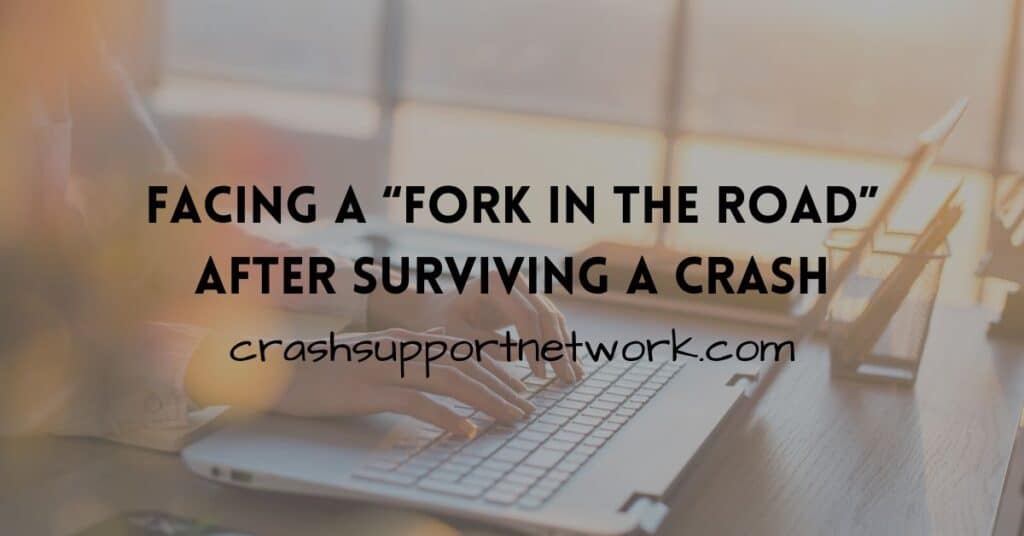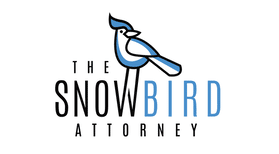
A motor vehicle crash can be metaphorically explained as a “fork in the road” due to the critical decisions crash survivors must make in the aftermath of the crash. This unexpected turn forces us to make important choices that redefine our journey that significantly impacts our physical well-being, emotional recovery, financial stability, and overall life trajectory.
The Choices We Make
Imagine a person who has recently survived a serious motor vehicle crash. They have now hit a “fork in the road” regarding their physical and emotional recovery where one must choose between two or more distinct paths or options. It symbolizes a moment of decision or a crossroads in life where one has to make a choice that will significantly impact their future direction. The fork in my road included a distracted driver traveling at a high rate of speed and a transport truck that left me seriously injured with a long recovery ahead of me. Here are the most important decisions every crash survivor has to make after they are injured in a motor vehicle crash and start their recovery.
Rehabilitation Choices: After a serious motor vehicle crash resulting in physical injuries, seeking medical treatment is crucial and the survivor is faced with a choice regarding rehabilitation. They can decide to actively engage in physical therapy, follow medical recommendations, and work towards regaining mobility and strength. This pro-active approach may lead to a more successful physical recovery. On the other hand, the survivor could choose to resist rehabilitation efforts, neglect medical advice, and avoid the challenges of the recovery process. This choice might hinder their physical recovery and long-term well-being.
Seeking Professional Support: The crash survivor may choose to seek professional help, such as therapy or counseling, to address the emotional trauma and psychological impact of the crash. This decision acknowledges the importance of mental health and aims to work through any post-traumatic stress, anxiety, or other emotional challenges that may have arisen from the crash. On the other hand, the survivor might decide to internalize their emotions, avoid seeking professional support or discussing the emotional aftermath of the crash and think they are okay. This choice may hinder their ability to fully process the trauma and could lead to long-term emotional challenges.
Legal Action Decision: Being injured in a motor vehicle crash, the survivor faces a choice whether or not to seek legal action. They may decide to consult with a Personal Injury Lawyer and pursue a personal injury claim to seek compensation for medical expenses and damages. This pro-active choice may help them secure the financial support that is needed for their recovery. On the other hand, the survivor might choose not to pursue legal action, perhaps due to lack of understanding the process or the emotional and financial toll they think it may have on them. This decision could impact their ability to receive compensation for months or even years of medical treatments.
Vehicle Replacement vs. Repair: If the survivor’s vehicle was severely damaged in the crash, they must decide whether to repair it or replace it. Opting for repairs might be a more cost-effective short-term solution, while choosing to replace the vehicle may provide a sense of safety and security especially if the survivor is reluctant to get behind the wheel of another vehicle. This decision can influence the survivor’s daily life and transportation options.
All the examples we have mentioned signifies the survivor’s choice between actively addressing and working through the emotional consequences of the crash or avoiding and internalizing those emotions. The decision made at this point can significantly influence the survivor’s mental well-being and their ability to move forward positively after experiencing this traumatic experience.
Navigating our Path Forward
It’s a critical juncture where survivors must take steps toward healing and recovery that shape their path ahead. Whether it’s navigating medical recovery, legal decisions, or healing emotionally, each path we choose shapes our comeback story. If you are recovering from a motor vehicle crash, try your best to embrace the challenges, seek support from the Crash Support Network, join our online support community and let resilience guide you towards a brighter destination.
Every step in your recovery is a testament to the human spirit’s capacity to overcome. Make those decisions with courage, and let the good days and bad days sculpt your unique story!
S. Dawne McKay is a survivor of a horrific crash that changed her life forever. Dawne shares her personal journey as a Crash Survivor Blogger and also collaborates with crash survivors as Guest Bloggers allowing them an opportunity to share their stories. Dawne is also the author of the book, “Talk Crash to Me – What to Expect After Surviving a Collision and How to Manage Your Recovery” which is available for purchase on Amazon.
The Crash Support Network is a unique one-of-a-kind website consisting of an online support group, a crash survivor blog, a quarterly newsletter, “Sharing Our Recovery” as well as highly informative articles. Our website is based on relationship-building and puts the needs of survivors first by creating a helpful resource for victims and survivors of motor vehicle crashes.



